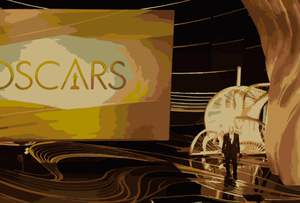 "
"
On March 10, the Academy of Motion Picture Arts and Sciences (AMPAS) held its 96th Academy Awards. The show, colloquially known as the Oscars, was hosted by Jimmy Kimmel.
The first award of the night and the first of the “Big Four” acting awards, Best Actress in a supporting Role, was given to Da’Vine Joy Randolph. Her performance in Alexander Payne’s ‘70s period dramedy “The Holdovers” has taken this awards cycle by storm, having also won at the Screen Actors Guild (SAG) Awards and the Golden Globes.
Best animated feature went to Hayao Miyazaki for his film “The Boy and the Heron,” which notably beat out “Spiderman: Across the Spider-Verse.” This marks Miyazaki’s second win after his 2001 film “Spirited Away.”
The writing awards for adapted and original screenplays went to Cord Jefferson’s “American Fiction” and Justine Triet’s “Anatomy of a Fall,” respectively. However, perhaps the most special moment for Triet’s film, which also won the prestigious Palme d’Or at the Cannes Film Festival, was when star dog, Messi, was seen clapping his paws for Robert Downey Jr. during the announcement of best actor in a supporting role. Robert Downey Jr. won for his powerhouse performance as Lewis Strauss in “Oppenheimer,” which swept this year’s award season.
Best international feature film and best sound design were awarded to Jonathan Glazer’s haunting World War II drama “The Zone of Interest.” Glazer’s acceptance speech proved to be controversial, however. He argued that Jewish identity should not be used as justification for violence in Gaza, saying, “Right now we stand here as men who refute their Jewishness and the Holocaust being hijacked by an occupation which has led to conflict for so many people. Whether the victims of October the 7th in Israel or the ongoing attack on Gaza, all the victims of this dehumanization, how do we resist?”
Some supported his statement, while others denounced it as anti-Semitic. Hundreds of Jewish people in the film industry replied in the “Statement from Jewish Hollywood Professionals,” saying, “We refute our Jewishness being hijacked for the purpose of drawing a moral equivalence between a Nazi regime that sought to exterminate a race of people, and an Israeli nation that seeks to avert its own extermination.”
Other technical awards were split between Christopher Nolan’s “Oppenheimer” and Yorgos Lanthimos’s “Poor Things,” the former winning for score, editing, cinematography and direction and the latter winning makeup, production and costume Design.
Best actor in a leading role was awarded to Cillian Murphy for his performance as the namesake of “Oppenheimer,” marking his first nomination and win in his three-decade career.
The penultimate award and perhaps the tightest race of the evening was for best actress in a leading role, which had already sparked controversy after Margot Robbie did not receive a nomination for her performance as the title role in “Barbie.” In the end, Emma Stone’s inventive and alluring performance in “Poor Things” proved victorious over Lily Gladstone’s quietly arresting performance in “Killers of the Flower Moon.” Stone’s win marked her second Oscar award for actress in a leading role.
Prior to the evening, Gladstone and Stone had split this award season down the middle in this category — Stone winning the BAFTA and Golden Globe for leading actress and Gladstone winning the SAG (generally accepted to be the best indicator for the Oscars’ outcomes) and Golden Globe for leading actress in a drama. Stone’s win over Gladstone has since reignited debate about the lack of diversity of award winners. Gladstone was the first Native American actress to be nominated in this category, and it wasn’t until last year that an Asian woman won the category, with Michelle Yeoh receiving the award for “Everything Everywhere All At Once.” Yeoh is only the fourth woman of color to ever take home the accolade.
That being said, this year saw historic diversity in the acting nominees. In addition to winners Randolph and Gladstone, other people of color to receive nominations included Colman Domingo (“Rustin”) and Jeffrey Wright (“American Fiction”) for leading actor, Sterling K. Brown in supporting actor (“American Fiction”), and Danielle Brooks (“The Color Purple”) and America Ferrera (“Barbie”) for supporting actress. The LGBTQ+ nominees include aforementioned Domingo and two-time Oscar winner Jodie Foster for supporting sctress (“Nyad”).
The biggest award of the evening, best picture, was given to the epic “Oppenheimer,” marking Christopher Nolan’s first win in this category, in addition to his first win for best director.
“Oppenheimer” ended the night with the most wins at seven with “Poor Things” and “The Zone of Interest” following at four and two, respectively. Box-office champion “Barbie” notably walked away with only one award — best original song for Billie Eilish’s “What Was I Made For?” Ryan Gosling’s performance of “I’m Just Ken,” however, still allowed Gerwig’s film to maintain a strong presence during the awards show.
Notably missing from the winners were Martin Scorcese’s “Killers of the Flower Moon,” Celine Song’s “Past Lives,” and Bradley Cooper’s “Maestro,” the latter of which gained infamy due to Cooper’s enthusiastic campaigning for awards.